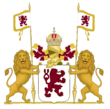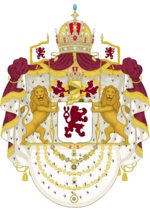Government of Werania: Difference between revisions
Britbong64 (talk | contribs) |
Britbong64 (talk | contribs) |
||
| Line 59: | Line 59: | ||
| width=5px style="background-color: #FF6A00" | | | width=5px style="background-color: #FF6A00" | | ||
| [[Ministry of Foreign Affairs (Werania)|Minister of Foreign Affairs and Euclean Relations]]<br><small>''Minister für Auswärtige Angelegenheiten und Eucläische Beziehungen''</small> | | [[Ministry of Foreign Affairs (Werania)|Minister of Foreign Affairs and Euclean Relations]]<br><small>''Minister für Auswärtige Angelegenheiten und Eucläische Beziehungen''</small> | ||
| [[File:2021-12 | | [[File:Alexander Schallenberg (2021-03-12, cropped).jpg|60px]]<br>[[Otto von Raitbor-Questenberg]] | ||
| 14 June 2023 | | 14 June 2023 | ||
| [[House of Deputies]] | | [[House of Deputies]] | ||
Latest revision as of 02:10, 12 December 2023
| Government of Werania | |
|---|---|
 Logo of the Weranic government | |
| Overview | |
| Established | 1842 (inaugural) 1993 (current constitution) |
| State | Weranian Confederation |
| Leader | Premier |
| Appointed by | Federal Presidency |
| Main organ | Cabinet |
| Responsible to | Bundestag House of Councillors • House of Deputies |
| Headquarters | Obermenstraße, Westbrücken |
 |
|---|
| This article is part of a series on the politics and government of Werania |
|
|
The Weranian Federal Government (Weranian: Ostischer Bundesregierung) exercises executive authority over Werania. It consists of the Premier and a cabinet of 16 ministries, known as Federal Ministers (bundesminister). Junior ministers are not part of the wider Cabinet. Members of the Cabinet are collectively responsible to the Bundestag and can be removed through a vote of no confidence in the House of Deputies. The Premier officially appoints and can dismiss members of the cabinet.
The current Cabinet was inaugurated on the 14 July 2023 following the assumption to the premiership of Anton Raicevich. All 16 members are from the National Consolidation Party. Four individuals who are not members attend cabinet meetings, with two being from the NKP and two not affiliated with a political party.
History
Appointment
Cabinet ministers in Werania are appointed by the Premier. All members of the Cabinet must sit in either of the two chambers in the Bundestag. Since 1993, dual mandates of non-parliamentary positions have been illegal for cabinet members. Cabinet members must themselves be civilians who are full citizens of Werania, over the age of 25 and have not committed a felony.
Members of the cabinet enjoy immunity from legal prosecutions unless the Premier and Attorney General agree to open investigations against members. Cabinet members are obliged to resign en masse if the cabinet loses a vote of no confidence and at the end of a parliament's term. During the period in which a cabinet has resigned but a new one has not yet been formed the cabinet becomes a demissionary cabinet which only retains emergency powers.
The cabinet is divided into two positions - members who head ministries and vote within internal cabinet meetings and those who are not officially members who are appointed by the Premier to attend cabinet meetings but neither head a ministry nor are able to vote on policy matters. Junior ministers known as ministers of state (staatsminister) are also appointed within ministries to handle more specialised portfolios, but are not considered part of the cabinet requiring the premier's permission to attend cabinet meetings and doing so as non-voting members.
Formation
The formation of the cabinet is constitutionally a complex affair. Following an election wherein no party gets a majority the monarch is tasked to appoint an informateur who seeks potential coalition configurations by consulting between parties before reporting to the monarch to appoint a regierungsbildner (usually the leader of the largest party of a potential coalition) to form a government. The regierungsbildner is considered to be the prospective premier.
The cabinet is elected alongside the premier by the House of Deputies by a simple majority ballot. Once the cabinet is approved by a majority of legislative deputies the monarch then formally approves of the candidacy - if the Monarch rejects the nomination from the legislature the Monarch and Bundestag are given a week to come to a consensus - ultimately however if no consensus is reached the House of Deputies's nomination automatically becomes a member of the cabinet.
Government mandate
Structure
Defunct positions
Current composition
Official cabinet members
Also attending
| Position | Member | Member since | Seat | Political party | |
|---|---|---|---|---|---|
| House of Councillors Legislative Coordinator Ratsmitgliederhaus Legislativkoordinator |
 Norbert Böhmer |
28 June 2019 | House of Councillors | NKP | |
| House of Deputies Legislative Coordinator Abgeordnetenhaus Legislativkoordinator |
 Regina Windisch |
14 June 2023 | House of Deputies | NKP | |
| Attorney General Generalstaatsanwalt |
 Volker Bottenbruch |
20 August 2012 | N/A | Independent | |
| Federal Chancellor Bundeskanzlerin |
 Isabella Leitgeb |
15 July 2011 | N/A | Modern Centre (Membership suspended) |















